Jailed Iran Trade Unionist Warns Of Mounting Pressure On Workers
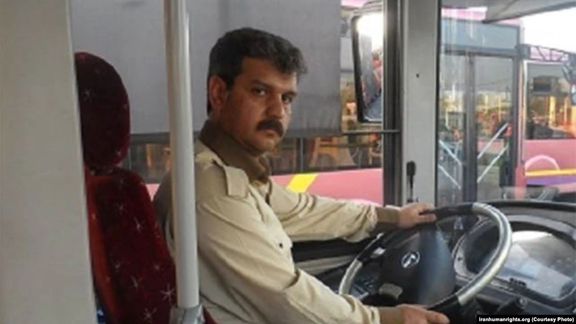
Iranian trade unionist Reza Shahabi has warned in a letter from Tehran's Evin prison about increasing government pressure on protesting workers.

Iranian trade unionist Reza Shahabi has warned in a letter from Tehran's Evin prison about increasing government pressure on protesting workers.
“Since its establishment, the Islamic Republic has drawn daggers against the workers,” said Shahabi in the letter published on social media.
Shahabi, a member of the Workers Syndicate of Tehran and Suburbs Bus Company (Sherkat-e Vahed), was arrested following a strike and protests by Tehran bus drivers last year.
He was arrested May 12, 2022 as Tehran’s bus drivers began a strike over unpaid wages, creating chaos across the city with security forces in the streets and the government wary of possible protests over rising food prices.
Addressing the International Labor Organization, he stated in his letter that since its establishment, the Islamic Republic has tried to replace the labor councils, trade unions and independent labor organizations with state organizations whose members are appointed by the regime.
“These organizations all operate under the supervision of the regime and act like secret police in factories and workshops and do not allow the workers to protest. They identify the protesting workers and report them to the security forces or the management.”
In the end, this labor activist urged ILO members to "pay attention to the request of the oppressed workers of Iran, who are just trying to survive in unequal conditions with minimum resources."
Shahabi also confirmed that a new security case has been filed against him, as well as Keyvan Mohtadi and Hassan Saeedi to mount pressure on labor activists.
In 2012, Shahabi was jailed for seven years on security charges - "assembly and collusion against state security" and "spreading propaganda against the system – two years after he was first imprisoned.

US Secretary of State Antony Blinken will visit Saudi Arabia next week, amid Riyadh’s shifting foreign policy drawing closer to Beijing and a détente with Iran.
While the US was making the announcement, Saudi Arabia’s foreign minister Faisal bin Farhan met with his Iranian counterpart Hossein Amir-Abdollahian in South Africa during the BRICS summit and pledged to visit Tehran soon.
Blinken’s visit will be the second high-level mission in one month to mend fences with the region’s ascending power and the dealmaker in OPEC+. In May, national security adviser Jake Sullivan also visited the kingdom.
Although no breakthroughs are expected, Reuters quoted analysts as saying that the aims of the trip include to regain some sway with Riyadh over oil prices, to fend off Chinese and Russian influence, and to nurture hopes for an eventual Saudi-Israeli normalization.
In a brief statement, the State Department said Blinken would visit Tuesday to Thursday to discuss economic and security cooperation as well as for a US-Gulf Cooperation Council meeting and a conference on combating Islamic State militants.
But the Saudi decision in March to re-establish diplomatic relations with Iran after seven years of bitter animosity, signaled a serious shift in Riyadh’s foreign policy especially that the deal was forged with Chinese mediation in Beijing.
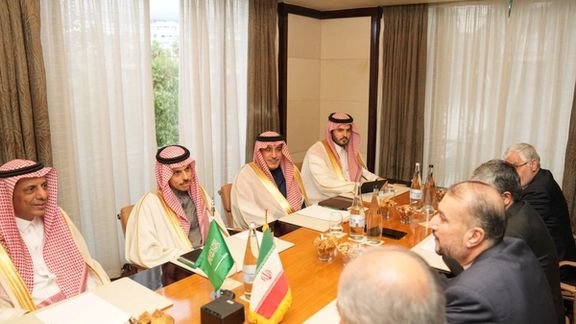
Other regional developments followed that further demonstrated a shift by Saudi Arabia, which feels it is in a position to act independently. Riyadh helped re-habilitate Syria’s dictator Bashar al-Assad among Arab nations by inviting him to an Arab summit in May. Assad is a close ally of Iran.
Perhaps equally important was an announcement on May 31 by the United Arab Emirates, a close Saudi ally, that it has withdrawn from the US-led maritime security coalition in the region.
"As a result of our ongoing evaluation of effective security cooperation with all partners, two months ago, the UAE withdrew its participation in the Combined Maritime Forces," the Ministry of Foreign Affairs said in a statement.
The Combined Maritime Forces is a 34-nation task force, headquartered at the US naval base in Bahrain, working on security, counterterrorism and counter-piracy in the Red Sea and Persian Gulf areas. But in fact, the US and Israel were trying to forge a regional coalition to contain Iran, including an air defense network.
President Joe Biden seriously annoyed Riyadh both before and after getting elected. In 2019 he said that he would treat Saudi Arabia like "the pariah that they are" and, soon after taking office in 2021, releasing a US intelligence assessment that Saudi Crown Prince Mohammed bin Salman approved the operation to capture or kill dissident Saudi figure Jamal Khashoggi.
But Riyadh began losing faith in its long-standing alliance with Washington, when even former President Donald Trump refused to retaliate against a major Iranian drone and missile attack on Saudi oil installations in September 2019.
"They (the Saudis) wanted to see rubble bounce in Tehran after Abqaiq," Reuters quoted David Des Roches of the US National Defense University, saying about the attack on the oil installations. Riyadh had expected Trump to respond by ordering air strikes.
Saudi leaders also observed that while it was under the constant danger of missile and drone attacks by Iran and its proxy allies in Yemen, the Biden administration was trying to restore the 2015 JCPOA nuclear deal, which would end major sanctions against Tehran, indirectly enabling it to build up its military power and proxy forces in the region.

Iran's top Sunni cleric Mowlavi Abdolhamid says clerics and religious seminaries must not be funded by the government to remain independent and critical.
“Clerics must be independent and have their own opinions to be able to speak the truth and call the government to enjoin what is good and forbid it from doing what is wrong,” Abdolhamid said in yet another fiery Friday sermon in the southeastern city of Zahedan.
Abdolhamid who has proven to be the unofficial voice of the country’s Sunni population told his congregation that he has on many occasions warned that seminary students and teachers must not receive salaries from the government and seminaries should not be funded by the government.
The Sunni cleric has somewhat become popular even among Shiites for standing up to the regime.
The outspoken cleric stressed that he believes people should be responsible for funding and managing religious institutions. “It’s a great mistake to allocate a budget to seminaries and religious scholars.”
Salaried religious scholars will be dependent on the government and “their mouths will be shut like they have adopted silence [about what the government is doing] now,” he said.
Iran's government annually allocates tens of millions of dollars to religious seminaries and other religious institutions that play the role of its propaganda arm.
In his sermon Abdolhamid also referred to the recent revelations of former director of the notorious Evin prison in Tehran, Hossein Mortazavi-Zanjani, who on April 29 had alleged that President Ebrahim Raisi, then the deputy prosecutor of Tehran, was directly involved in the killing of political prisoners in 1988.
Mortazavi-Zanjani had also said that virgin female prisoners were forcibly married to jailers and raped by them before being executed to stop them from being admitted to heaven on account of their virginity when they died.
“I was shocked by what I heard,” he said, adding that religious scholars (senior clergy) must not remain silent about this matter and the atrocities happening in Iranian prisons now.
The executions were carried out based on a fatwa by Iran's then supreme leader, Ruhollah Khomeini, against the MEK (The People's Mojahedin Organization of Iran) which carried out a wave of bombings in Iran and struck an alliance with Saddam Hussein during the 1980-88 war.
Most victims were linked to the MEK but there were also others with links to leftist and secular groups such as Fadaiyan Khalq Organization (FKO) and the Tudeh Party as well as some Kurdish groups such as Komala and the Kurdish Democratic Party of Iran.
In his sermon, Abdolhamid once again brought up the issue of a referendum to allow the people of Iran to express their views about clerical rule.
“It was our fault that they don’t want Islam and they should not be hit in the head to accept a certain thing now that they are dissatisfied [with the Islamic Republic],” he said, adding that everyone, whether religious or non-religious, should be allowed to live peacefully together and build the country’s future.
“The religious should be allowed to pray and those without religion should be able to do whatever they want. That’s why there should be referendum to find out what the absolute majority of people want and accept,” he said.
Abdolhamid was among the first regime critics who called for a constitutional referendum about 50 days into the wave of protests following the death in custody of 22-year-old Mahsa Amini in September.
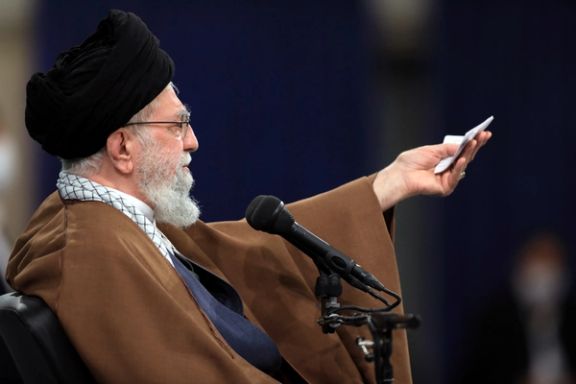
Supreme Leader Ali Khamenei has flatly dismissed the possibility of a referendum and suggested that people lack the faculties required for making decisions about important matters.
After the prayers, Abdolhamid’s congregation took to the streets of Zahedan for the 35th consecutive week and chanted slogans against the regime. Residents have been protesting every Friday since September 30, when security forces opened fire on civilians, killing nearly 90 protesters. The incident has come to be known as the Bloody Friday of Zahedan.
Sunnis constitute at least 10% of Iran's 88 million population and Zahedan, where thousands attend Abdolhamid’s Friday prayers every week is one of the few Sunni-majority cities in predominantly Shiite Iran.
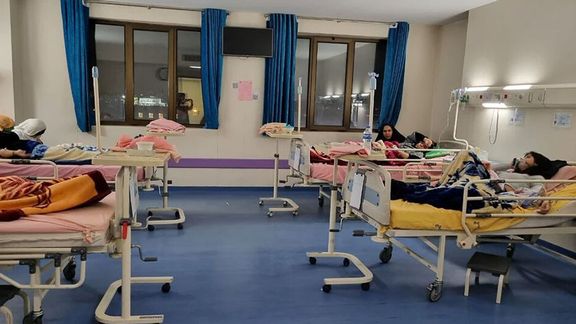
A popular dissident Twitter account, 1500tasvir, says preliminary results of tests done on clothing of poisoned schoolgirls in Iran suggests the use of a nerve agent.
In a series of tweets Wednesday, the group which is based abroad said samples of clothing of poisoned students it had received from Iran were tested by a group of experts who used the GC-MS technique to detect the gases absorbed by the clothing.
Tests indicated that the clothing items had been exposed to a set of molecular masses including those with a mass of 99 which suggested the presence of fluoromethyl phosphate, the report said, adding that fluoromethyl phosphate is the common agent among many highly toxic gases such as sarin, cyclosarin, soman.
The 1500tasvir report also said identifying the exact type of gas used in the attacks requires two high-resolution mass spectroscopy experiments on the molecular mass which the experts will carry out and urged families of victims to send more samples including hair samples.
The poisonings started in the religious city of Qom in central Iran November 30, spread throughout the country, and continued until the end of April, sending hundreds of students to hospitals and at least one case of death was reported.
The city of Qom with a population of over 1.2 million is home to most of Iran's religious seminaries and an important Shiite shrine.
Many ordinary Iranians have been suspicious of involvement of the regime itself, or religious extremists protected by the regime, calling the attacks “state terrorism”. Some argued that because teenagers and young people were playing a major role during the protests, and many young girls had removed their headscarves in protest, regime hardliners wanted to punish them.
Some of the victims reported falling ill after an aroma, resembling tangerines, or a putrid stench filled the air in their classrooms. Hundreds had to be hospitalized with some staying in hospital for up to a week due to the severeness of their symptoms including palpitation, headache, nausea, cough, sore throat, or temporary paralysis and weakness but most others were released within hours. In some cases, symptoms lasted for weeks.
In a statement on April 28, the intelligence ministry denied any indication that poisonous substances had caused the illness of students and said samples taken from the scene of the incidents examined by “the most reliable laboratories” in the country had not yielded any suspicious materials.
The ministry claimed illness of students was caused by stink bombs (stinkpots), pepper sprays, tear gas and similar substances used by students to disrupt classes and accused “foreign enemies” and media outside Iran, particularly those broadcasting in Persian, of using school poisoning incidents to ignite unrest because the Mahsa protests that started in mid-September had begun to subside.
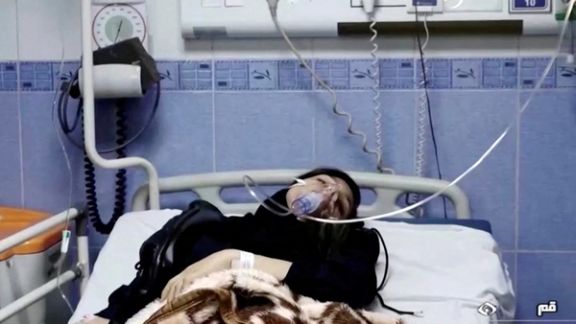
The ministry also mentioned spurious causes, such as gas fuel leak from vehicles and urban gas, smoke from trash burning outside schools, and mass psychogenic illness resulting from stress and said nearly all the students hospitalized following the incidents had recovered by simple treatments such as oxygen, saline and dextrose intravenous injections, and sedatives to treat anxiety.
During the height of the attacks, state media tried to downplay the seriousness of the incidents and authorities warned the local media to avoid reporting of the incidents.
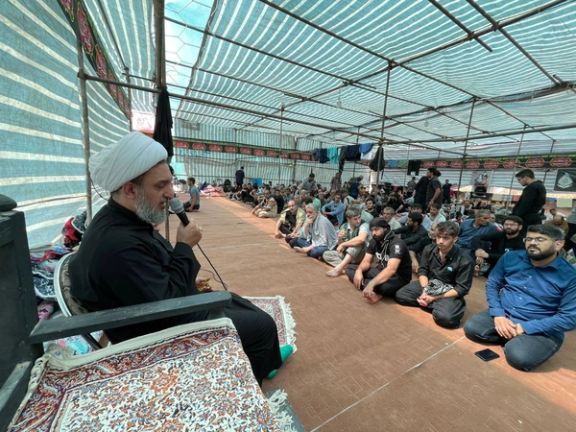
A senior Iranian cleric says around 50,000 of Iran's 75,000 mosques are closed, showing the declining numbers of Iranians attending.
Expressing regret over the low numbers engaged in worship, Mohammad Abolghassem Doulabi, who serves as the liaison between Ebrahim Raisi’s administration and the country’s seminaries, said on Thursday that the numbers are a "worrying admission” for a state built around the principles of Islam.
Doulabi, who is also a member of the Assembly of Experts – a deliberative body empowered to appoint the Supreme Leader – said the outcome of religion in Iran has led to people leaving religion.
Emphasizing the weakening of religiosity among society and in turn, a weakening legitimacy of a government ruling by religious diktat, he said: “When people look at the output of the religion, they decide to enter the religion or leave the religion," with reasons including “the humiliation of people in the name of religion," “falsification of religious concepts and teachings,” and “depriving people of a decent life and creating poverty in the name of religion.”
He made the remarks as growing numbers of Iranians of all ages are becoming weary of the regime's justification of Islam as the base of its brutal dictatorship, reflected by months of violent protest since September in the wake of the death in morality policy custody of Mahsa Amini, arrested for the inappropriate use of her hijab.
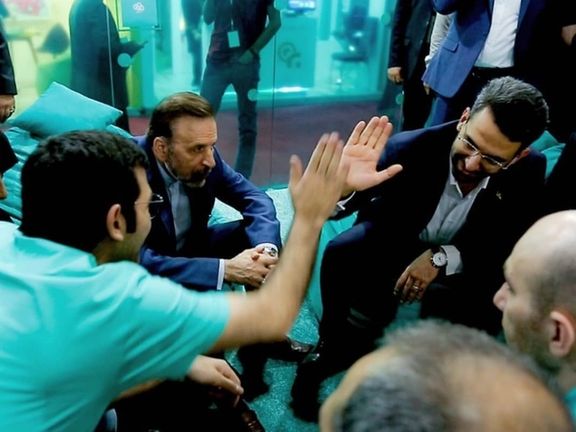
The US has sanctioned Iran-based tech firm Arvan Cloud, its co-founders, and an affiliate UAE-based company over helping the regime censor Internet in Iran.
In a statement issued on Friday, the US Department of the Treasury said Arvan Cloud has a close relationship with Iran’s intelligence services, including the Ministry of Intelligence and Security, and the company’s executives have extensive ties to senior government officials.
The EU had sanctioned the company in November.
Reiterating that unrestricted access to information is fundamental right, Under Secretary of the Treasury for Terrorism and Financial Intelligence Brian E. Nelson said, “The US is committed to holding accountable those who seek to undermine freedom of expression and suppress dissent, and to call out regimes who deny their citizens this right.”
Navyan Abr Arvan Private Limited Company, known as Arvan Cloud, and two of its founders Pouya Pirhosseinloo and Farhad Fatemi and the Dubai-based ArvanCloud Global Technologies worked with Iran’s Information and Communications Technology Ministry to develop a countrywide intranet that is being used to disconnect the Iranian people from the global Internet.
Mehdi Bahadori and Alireza Hashemi are the other co-founders and Keivan JameBozorg is the company's chairman of the board. They were not included in the US list of sanctions.
The Iranian government has regularly used Internet restrictions and the throttling of Internet speeds to suppress dissent, surveil and punish Iranians for exercising their freedom of expression and assembly both online and offline, and limit the dissemination to the international community of credible information about egregious human rights violations.